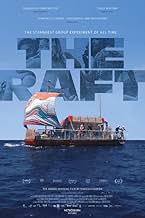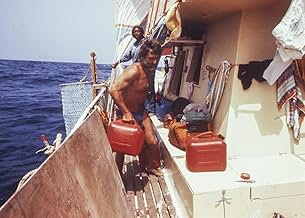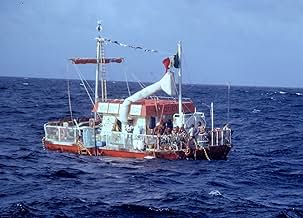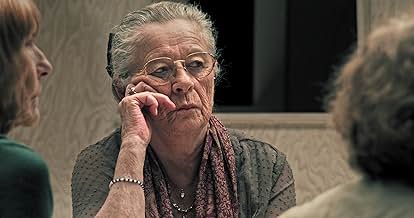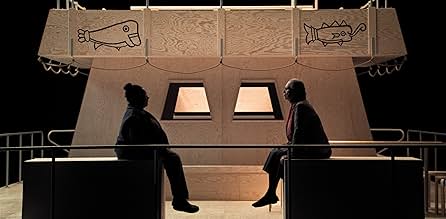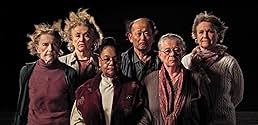NOTE IMDb
6,6/10
1,1 k
MA NOTE
En 1973, cinq hommes et six femmes ont traversé l'Atlantique à la dérive sur un radeau dans le cadre d'une expérience scientifique étudiant la sociologie de la violence, de l'agression et de... Tout lireEn 1973, cinq hommes et six femmes ont traversé l'Atlantique à la dérive sur un radeau dans le cadre d'une expérience scientifique étudiant la sociologie de la violence, de l'agression et de l'attirance sexuelle dans les humains.En 1973, cinq hommes et six femmes ont traversé l'Atlantique à la dérive sur un radeau dans le cadre d'une expérience scientifique étudiant la sociologie de la violence, de l'agression et de l'attirance sexuelle dans les humains.
- Réalisation
- Scénario
- Casting principal
- Récompenses
- 6 victoires et 8 nominations au total
Daniel Giménez Cacho
- Narrator
- (voix)
- …
Fe Seymour
- Self
- (as Fé Seymour)
Santiago Genovés
- Self
- (images d'archives)
Bernardo Bongo
- Self
- (images d'archives)
Charles Anthony
- Self
- (images d'archives)
- (as Charles Antoni)
José María Montero Pérez
- Self
- (images d'archives)
Olaf
- Self - Maria Björnstam's Boyfriend
- (images d'archives)
- (voix)
Avis à la une
The premise is fascinating, especially when you get the build up of the first 5-10mins...the problem is...nothing happens.
I'd avoid this sad association with what are usually compelling and insightful Storyville documentaries.
I'd avoid this sad association with what are usually compelling and insightful Storyville documentaries.
There is a fair amount of "stuff" going on here. Arguably the most interesting aspect of this experiment is the manner in which it is conducted - . An aspect that isn't scrutinised in any greater depth.
There are a few, non negotiable, rules that apply to scientific experiments, a number of which were broken in this study:
So... before the experiment began it was, from a scientific point of view a "non-starter".
So... whatever The Raft was - it was not a scientific study and it's findings, whatever they turned out to be, were unlikely to be accepted by any form of "academia".
Then there are the obvious, and hugely relevant, ethical questions. That any higher educational establishment would allow an experiment which, in its definition, aims at placing "real people" in harms way just to study how they would react - is incomprehensible.
There is a documentary to be had out of all this - it's the one covering how it was ever allowed to happen and why nobody ended up in court after its completion.
There are a few, non negotiable, rules that apply to scientific experiments, a number of which were broken in this study:
- A honest researcher doesn't have an agenda to, by means of bias, validitie their hypothesis. A study/experiment is exactly what it implies - a test to see if a theory can be further validated. Trying to influence a study to prove your point is a big no-no.
So... before the experiment began it was, from a scientific point of view a "non-starter".
- A scientific study is most often, and certainly in the case, required to outline what "it is looking for" and "how it is going to be conducted" - before it begins. Changing objective and methodology once the study has commenced is another bi no-no
- The most flagrant breach of conduct is having the "scientist" play an active part in the study - and thus play an active roll in the findings. That is an, enormous, NO-NO.
So... whatever The Raft was - it was not a scientific study and it's findings, whatever they turned out to be, were unlikely to be accepted by any form of "academia".
Then there are the obvious, and hugely relevant, ethical questions. That any higher educational establishment would allow an experiment which, in its definition, aims at placing "real people" in harms way just to study how they would react - is incomprehensible.
There is a documentary to be had out of all this - it's the one covering how it was ever allowed to happen and why nobody ended up in court after its completion.
The documentary is about a true story, a human experiment in the 1970's. Films I have seen about such experiments have been interesting so far. How about an idea of crossing the Atlantic on a small raft with unknown people? That is mind-blowing, huh? On top of that, the sailors would be chosen from different cultures and backgrounds, selected by a researcher who is also on board.
The Swedish captain is the only experienced sailor on board. She and the rest of the crew are selected by the researcher Santiago Genovés. I had never heard of him nor the actual experiment before watching The Raft.
Archive footage from the actual raft is great stuff, but it looks too good to be "true" at times. In a way that it could have been shot by a group of friends having fun on a boat. I do believe there has been hours of film footage from the journey to choose from. Both the happy and horrible moments. I do not want to spoil it, so I am not telling more about the footage.
Santiago Genovés desperately wanted to see some kind of primitive behavior on Acali, as the raft was called. Genovés is portrayed himself to have been mentally off-tuned. He tried to manipulate and provoke the crew so that he could to see more conflicts and violence.
Hearing the original crew members to open up about their well-kept secrets, feelings and memories is touching. The replica of the raft is very well made but studio athmosphere is not an ocean. The reunion on "the raft" after decades is a great idea and makes the crew recall some details.
There are still many questions after seeing The Raft and probably I need to find out myself if I want to know what happened after all. I expected something different, but it was worth seeing this film!
The Swedish captain is the only experienced sailor on board. She and the rest of the crew are selected by the researcher Santiago Genovés. I had never heard of him nor the actual experiment before watching The Raft.
Archive footage from the actual raft is great stuff, but it looks too good to be "true" at times. In a way that it could have been shot by a group of friends having fun on a boat. I do believe there has been hours of film footage from the journey to choose from. Both the happy and horrible moments. I do not want to spoil it, so I am not telling more about the footage.
Santiago Genovés desperately wanted to see some kind of primitive behavior on Acali, as the raft was called. Genovés is portrayed himself to have been mentally off-tuned. He tried to manipulate and provoke the crew so that he could to see more conflicts and violence.
Hearing the original crew members to open up about their well-kept secrets, feelings and memories is touching. The replica of the raft is very well made but studio athmosphere is not an ocean. The reunion on "the raft" after decades is a great idea and makes the crew recall some details.
There are still many questions after seeing The Raft and probably I need to find out myself if I want to know what happened after all. I expected something different, but it was worth seeing this film!
This is an unexpected gem, as funny as it is wise. I'd literally never heard of the Acali. Fifteen years on, we were still reading Lord of the Flies at school, and all the grown-ups around me were nodding sagely. Had the media told the story this film tells instead of dubbing Santiago Genovés' ambitious project the sex raft, public opinion might have changed. The anthropologist expected his volunteers to develop aggressions towards each other during their long and lonely voyage. They didn't. So he did. Until he broke down and cried for the first time since childhood. He certainly learned something - about himself. I have rarely seen such a convincing demonstration of the self-help truism that aggression, anger and an overdeveloped need for control stem from repressed grief. Who would have thought that a macho man in his fifties could put us vs. them aside after all, and open up so far? Still, what touched me most was the reunion of the surviving volunteers, more than four decades later: most of all Captain Maria, against whom Genovés mutineered, and engineer Fé, whom he tried to set up with the Catholic priest on the expedition for no better reason than the colour of their skins. Fé's story, in particular, made me want to follow the advice an euphoric Genovés gives to everyone after it's all over: build your own raft! She really nailed it when she said (quoting from memory, sorry for any mistakes): I think Santiago's experiment was a huge success, but he missed it.
I really enjoyed this film. The concept of the "experiment" was interesting to me from an anthropological perspective. I was fascinated getting to know the characters and how their experience progressed. It missed a 10 because I would've been okay with it being a little longer and getting to know more about the dynamics with the characters that past away before the film began.
Meilleurs choix
Connectez-vous pour évaluer et suivre la liste de favoris afin de recevoir des recommandations personnalisées
- How long is The Raft?Alimenté par Alexa
Détails
- Date de sortie
- Pays d’origine
- Site officiel
- Langues
- Aussi connu sous le nom de
- Flotten
- Lieux de tournage
- Canary Islands, Canarias, Espagne(departure of the trek)
- Sociétés de production
- Voir plus de crédits d'entreprise sur IMDbPro
Box-office
- Montant brut aux États-Unis et au Canada
- 39 678 $US
- Montant brut mondial
- 47 269 $US
- Durée1 heure 37 minutes
- Couleur
- Mixage
- Rapport de forme
- 2.35 : 1
Contribuer à cette page
Suggérer une modification ou ajouter du contenu manquant



